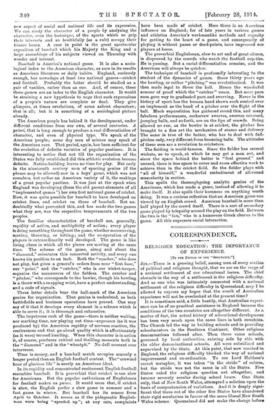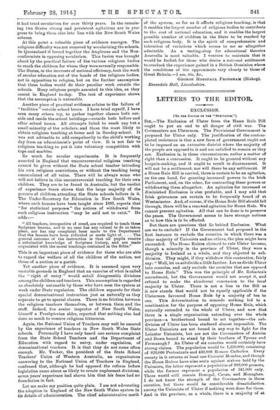CORRESPONDENCE.
RELIGIOUS EDUCATION THE IMPORTANCE OF EXPERIENCE.
[To ran Emeos or TIM "Ssrosaros."
BM—Thera is a growing belief, among men of every section of political and religious thought, that we are on the verge of a national settlement of our educational issues. The chief obstacle in the way of a settlement is the religions difficulty. And as one who was intimately connected with a national settlement of the religious difficulty in Queensland, may I be allowed to exprees my hopes that the result of Australian experience will not be overlooked at the present time?
It is sometimes said, a little hastily, that Australian experi- ence can be of no practical assistance in England because the conditions of the two countries are altogether different. As a, matter of fact, the actual history of educational development has been very much upon the same lines in both countries. The Church led the way in building schools and in providing schoolmasters in the Southern Continent. Other religious denominations followed after. Then there came schools, governed by local authorities, existing side by side with the older denominational schools. All were subsidized and supervised by the State. At this point, that now reached in England, the religious difficulty blocked the way of national improvement and co-ordination. To use Lord Hahlane's recent metaphor, it was taken "in the stride" of reform, but the stride was not the same in all the States. Five States ruled the religious question out altogether, and became severely secular during school hours. One State only, that of New South Wales, attempted a solution upon the basis of comprehension of variations. And it is deeply signi- ficant that three out of the other five States have abandoned their rigid secularism in favour• of the more liberal New South Wales scheme. Queensland did not Make the change before it had tried secularism for over thirty years. In the remain- ing two States strong and persistent agitations are in pro- gress to bring them also into line with the New South Wales scheme.
At this point a valuable piece of evidence emerges. The religious difficulty was not removed by secularizing the school& In Queensland it forced together the Anglicans and the Non- conformists in opposing secularism. This fusion was brought about by the practical failure of the various religious bodies to reach the children for whom they were severally responsible. The States, in the interests of national efficiency, took the work of secular education out of the hands of the religious bodies, not in opposition to religion, but on the further assumption that these bodies would do their peculiar work outside the schools. Many religious people assented to this idea, as they assent in England to-day. The test of experience shows that the assumption is untenable.
Another piece of practical evidence relates to the failure of "facilities" outside school hours. I have tried myself, I have seen many others try, to gather together classes both out- side and inside the school buildings—outside both before and after school hours. All attempts failed to reach any but a small minority of the scholars, and these the most likely to obtain religious teaching at home and in Sunday-school. It was not advisable to add compulsorily to the child's working day from an educationist's point of view. It is not fair to religious teaching to put it into voluntary competition with tops and marbles.
So much for secular experiments. It is frequently asserted in England that uncontroversial religious teaohing cannot be given without the State school teacher intruding Lis own religious convictions, or without the teaching being emasculated of all value. There will be always some who will not believe in this uncontroversial teaching for their own children. They are to be found in Australia, but the verdict of experience there shows that the large majority of the parents of children attending the State schools believe in it. The Under-Secretary for Education in New South Wales, where such lessons have been taught since 1881, reports that "for statistical purposes" the notices of withdrawal from such religious instruction "may be said not to exist." He adds:—
" All teachers, irrespective of creed, are required to teach these Scripture lessons, and in no ease has any refusal to do so taken place, nor has any complaint been made to the Department that the lessons have been ridiculed or made light of. . . . The general outcome of the instruction is that all pupils receive a substantial knowledge of Scripture history, and are made acquainted with the moral teachings contained in the Bible."
This is an important piece of evidence for those who are able to regard the welfare of all the children of the nation, not those of a section or a parish.
Yet another piece of evidence. It is assumed upon very unstable grounds in England that an exercise of what is called the " right of entry " would entail disagreeable divisions among the children and teachers. This assumption is regarded as absolutely untenable by those who have seen the system at work under State regulation. The children separate for their special denominational instruction just as naturally as they separate to go to special classes. There is no friction between the religious teachers themselves, or between them and the staff. Indeed, the senior inspector of New South Wales, himself a Presbyterian elder, reported that nothing else had done so much to remove religious bitterness.
Again, the National Union of Teachers may well be assured by the experience of teachers in New South Wales State schools. Personally I have only heard one serious complaint from the State School Teachers and the Department of Education with regard to entry, under regulation, of denominational teachers. It is that they do not come often enough. Mr. Tucker, the president of the State School Teachers' Union of Western Australia, an organization answering to the National Union of Teachers in England, confessed that, although be had opposed the reform before legislation came about as likely to create unpleasant divisions, seven years' experience had shown him that his fears had no foundation in fact.
Let use make my position quite plain. I am not advocating the adoption in England of the New South Wales system in i(s details of administration. The chief administrative merit
of the system, no far as it affects religious teaching, is that it enables the largest number of religious bodies to contribute to the cost of national education, and it enables the largest possible number of children in the State to be reached by each religious body. It is the spirit of comprehension and toleration of variations which seems to me so altogether admirable. As a testing-shop for educational theories Australia in most valuable. I venture to maintain that it would be foolish for those who desire a national settlement to overlook the experience gained in a British Dominion where the conditions of lite approximate very closely to those of Great Britain.-1 am, Sir, &c.,















































 Previous page
Previous page